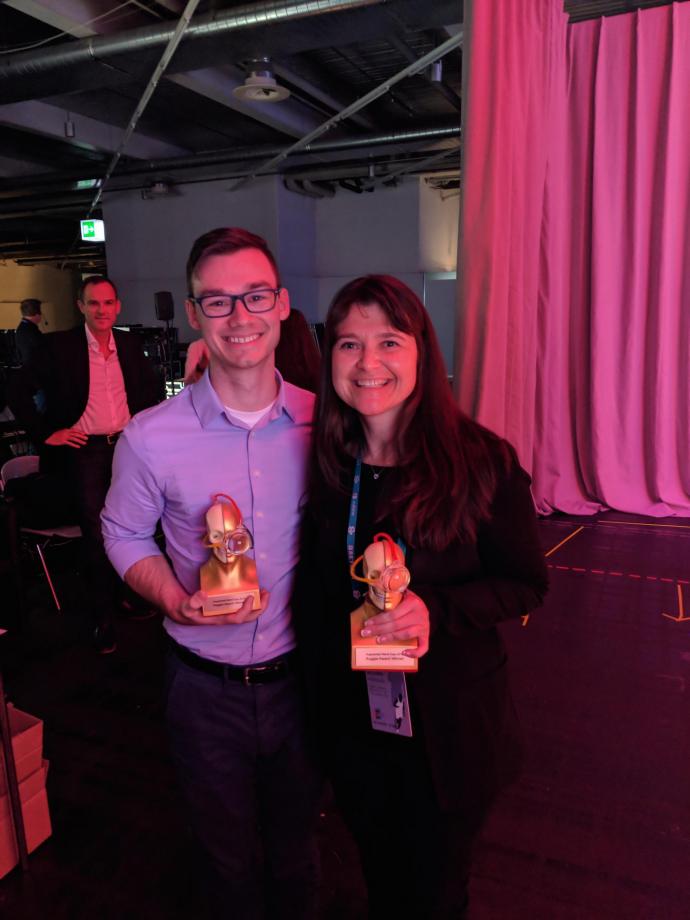Creating an Entrepreneurial Ecosystem: NJIT Invests in Faculty and Student Startups

Last year, a vision therapy device invented at NJIT with potential as a biomarker for concussion was recognized as “most innovative breakthrough” at the Augmented World Expo Europe. Despite the international accolade, getting VERVE (Virtual Eye Rotation Vision Exercises) out of the lab and into the health care marketplace was proving to be a mighty challenge for the team behind its development: Tara Alvarez, NJIT professor of biomedical engineering and founder/director of the university’s Vision and Neural Engineering Laboratory, and NJIT alumni John Vito d’Antonio-Bertagnolli ’16 M.S.’17 (biomedical engineering) and Chang Yaramothu ’13 M.S.’14 Ph.D.’17 (biomedical engineering).
They even established a company in 2018, OculoMotor Technologies, with VERVE as its centerpiece and respected backers and collaborators that include Children’s Hospital of Philadelphia, Salus University, the National Science Foundation Innovation Corps (NSF I-Corps) program and New Jersey Health Foundation. Still, they faced hurdles and uncertainty about the best path to take.
Enter NJIT, which like many universities across the country, has begun investing in — and helping to commercialize — the technological innovations of its faculty and students, as well as outside startups. Simon Nynens, vice president and chief commercial officer at NJIT, feels firmly that universities need to be more corporate-friendly in order to fully embrace faculty, student and external entrepreneurs early in their development processes. Otherwise, revolutionary research and trailblazing technologies may very well remain in labs.
“The reason that the university exists is (a) to do great research, but (b) to get that research [out] for the benefit of society as a whole,” said Nynens. “We are promoting an entrepreneurial ecosystem within the university.”
“In addition to further enhancement of the basic and applied research, NJIT is strategically committed to building an ecosystem for research translation to market and entrepreneurship, engaging all stakeholders for commercialization,” noted Atam Dhawan, NJIT’s senior vice provost for research. “Our faculty and researchers are working on the forefront of application-driven research of high-potential impact in the society. The Offices of Research and Technology Commercialization, with VentureLink [NJIT’s community business incubator], are working with NJIT researchers to help bring research innovation to real-world applications.”

Being proactive rather than reactive is key to mining what Nynens says are enormous greenfields of entrepreneurial potential, especially on college campuses. What is typically needed by those looking to take the leap with their innovations are professionals to assist them in navigating business waters. And even the most savvy may be unable to access the necessary financial support.
For example, the OculoMotor Technologies team learned that while small business innovation research funding through NSF I-Corps is the biggest catalyst for economic growth within the United States, “these mechanisms can only be applied to if you have a university-company relationship,” explained Alvarez. “So that’s another big reason as to why NJIT and the startup are a very good collaboration.”
Another issue is licensing, often a difficult mountain to climb for small-business entrepreneurs and one that Nynens says prevents many new technologies from being used in the real world. To facilitate licensing and all the other steps startups must take to realize success, he is leading a review of the best entrepreneurial practices of other universities and gleaning insights from venture capitalists — with an eye toward making the process at NJIT systemically standardized.
Why start NJIT’s call for commercialization with OculoMotor Technologies? “They were ready for the investment,” said Nynens. “They were ready to go.”
Case Study
For its investment in OculoMotor Technologies, NJIT was granted a small minority stake in the company and serves as a silent partner. “Technically, it’s not an investment. NJIT didn’t give us a sum of money in return for stock. … I guess you can say that it was in exchange for exclusive licensing and some favorable conditions in the licensing agreement,” said d’Antonio-Bertagnolli, CEO of the company.
“It’s much more beneficial for entrepreneurs,” Nynens emphasized of NJIT’s approach. “They should spend this [interest] on marketing and sales, not on paying back expenses to NJIT. … They need every penny to grow their company.”
Finances aside, familiarity with and being part of the NJIT community have also benefited OculoMotor Technologies. Yaramothu, the company’s chief technology officer and a postdoctoral researcher at NJIT, points to the university’s alumni network as a major source of inspiration and mentorship. And Alvarez, who serves as OculoMotor’s chief scientific officer (Mitchell Scheiman, O.D., of Salus University, rounds out the team as chief clinical officer) acknowledges the invaluable guidance from NJIT’s NSF I-Corps, run by Judith Sheft, associate vice president of technology development, and Michael Ehrlich, associate professor of finance.

But as d’Antonio-Bertagnolli puts it, they nonetheless only had a “microcosm of [entrepreneurial] culture” available to them at the outset. “There was no standardization, so every step we were taking … we kept getting handed off to another person,” Yaramothu recalled. “Then finally Simon came up at the right time. He standardized everything.”
Such standardization favors the entrepreneur and is “paramount to a golden ticket,” d’Antonio-Bertagnolli added. “Now that there’s a little bit more of a pathway established, I think we’ll have a boatload of student startups in the next few years.”
And, hopefully, many faculty startups as well. Alvarez gives a nod to NJIT’s forward-thinking investment in new businesses, which as it relates to OculoMotor Technologies, is also personal for her: “All of the decisions I make in my professional career go back to [my] mission statement, which is to truly make a positive impact on the health care of others. … I need to make that broad impact jump, which is to get the technology out of my lab into the society. And at least, right now where I am in my life, I feel the most productive way to do that is through a startup.”
Resources and Results
According to Nynens, NJIT looks to enable both faculty and students to compete at the highest levels of entrepreneurship by connecting aspiring business owners and building that entrepreneurial ecosystem at the university. Toward this end, NJIT will be creating residence hall-based communities for first-year students who are interested in entrepreneurship. These special wings will feature programs and extracurricular activities built around the university’s innovation and entrepreneurship curriculum. The project, the brainchild of William Lutz, director of commercialization at VentureLink, will help launch a continuum of entrepreneurial offerings throughout a student’s four years at NJIT.
It’s all about enablement, by providing a bridge between the university and entrepreneurs that nurtures successful outcomes, Nynens says. The ultimate goal is to give startup companies a better chance of surviving in a landscape often fraught with obstacles.
“Having a partnership like this where you don’t have to pay so much of the money back for patents and everything lets us survive a lot longer to get to the point of commercialization and having a product release,” offered d’Antonio-Bertagnolli.
“What it really comes down to is the thumbs-up that we got from NJIT,” Yaramothu said. “Here’s a reputable university that’s saying ‘this is a great technology, we believe in this team, they are going to succeed.’ And that also brings other venture capitalists [to invest in us]. That’s made a huge difference.”
Video by Andy Mattison
